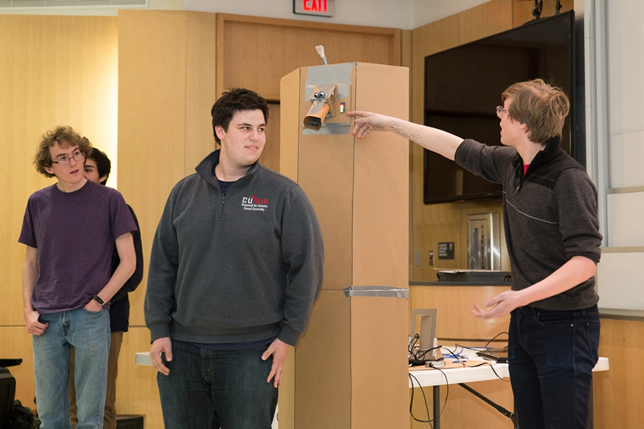High Schoolers Sweep Top Spots at Cornell MakeaThon
- By Dian Schaffhauser
- 03/01/16
What could you create if you were given a total of 24 hours in which to do it? Participants at Cornell University's recent "LC. Make-a-Thon" came up with a system for alerting guardians when sleepwalkers trigger a motion sensor (the LunarWalk), a system that uses humidity sensors to detect when food is in danger of being burned and automatically adjusts heat settings (Cook Guard) and a motion sensing showerhead to dispense less water when the user steps away and more water when the user gets closer (HydroHome).
Over the course of a weekend, 14 teams made up of college students and high schoolers identified problems, created working prototypes, pitched the audience on their ideas and did demos of their solutions. A high school team won first place.

The Cornell University students on "Team HydroHome" present their Make-a-Thon creation, the HydroHome smart shower. Chris Kitchen/University Photography.
The free event was the brainchild of Life Changing Labs, a student-run, nonprofit group on campus that helps students and faculty create and sustain start-up companies.
For this first go-around of the make-a-thon, participants were told to "to propose life-changing solutions using rapid prototyping techniques around the topic of smartliving." Teams were outfitted with prototyping resources, including pre-set Arduino boards, sensors and other materials such as foam and chipboard. Then they were given time to hack and build their prototypes and prepare a six-minute presentation that would be given during the last part of the program.
To make the event more interesting, judges weren't told who were the high schoolers and who were the college students.
First place was taken by a six-member team from Ithaca High School that created the "P!LLPAL," a bracelet that stores medicine and vibrates to let the wearer know it's time to take pills. Second place went to another high school team, which created Instalert, allowing people to be notified when cabinets with dangerous substances are being opened by small children. Each member of those teams won a $500 scholarship to the Life Changing Labs summer program.
About the Author
Dian Schaffhauser is a former senior contributing editor for 1105 Media's education publications THE Journal, Campus Technology and Spaces4Learning.